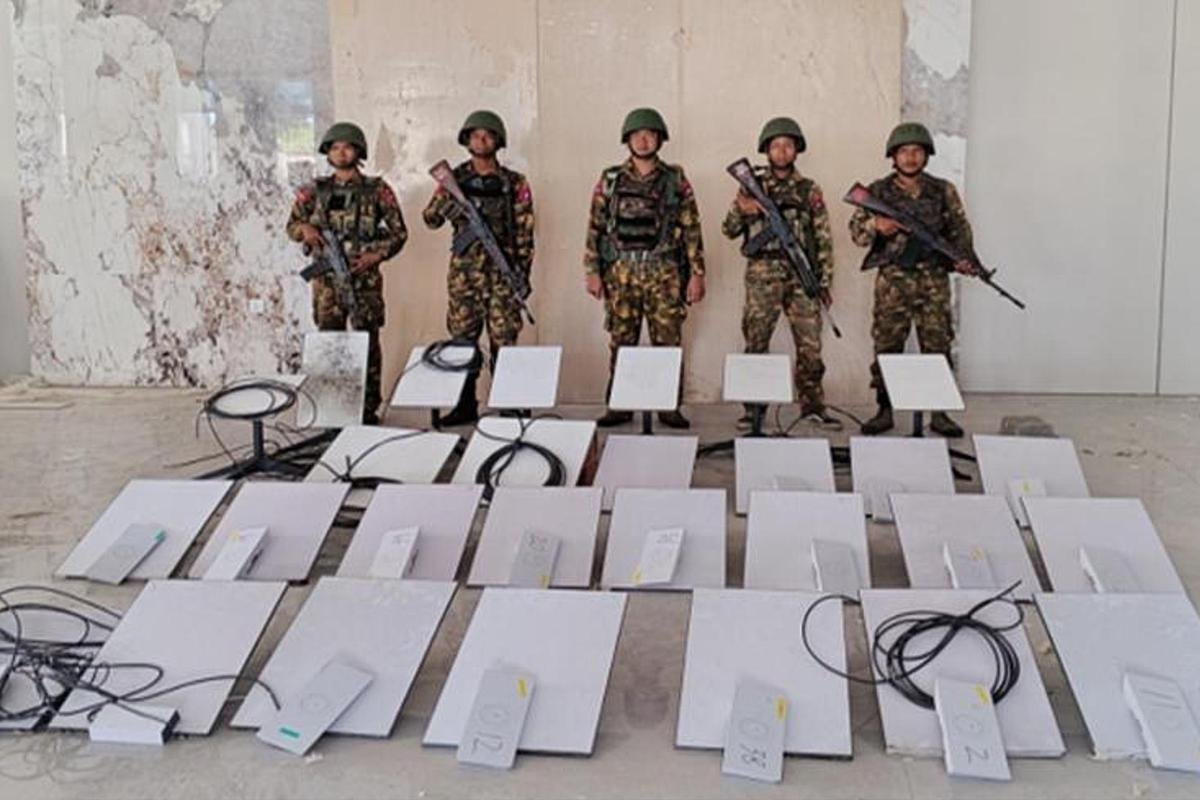BANGKOK: Myanmar’s military has carried out one of its largest cybercrime crackdowns to date, raiding a massive online scam hub in KK Park, near the Thai border. According to state media, more than 2,000 individuals were detained and over 30 Starlink satellite internet terminals were seized during the operation, which began in early September.
The raid comes amid growing international pressure from the United States, the United Kingdom, and China to combat transnational “cyberscam compounds” that have flourished across Southeast Asia. These criminal networks are accused of orchestrating romance scams, cryptocurrency fraud, and human trafficking, often targeting victims worldwide.
A Hub of Online Scams and Human Trafficking
Myanmar’s border regions have long been notorious for harboring cyber-fraud operations. Compounds like KK Park and Shwe Kokko lure foreign nationals with promises of high-paying tech jobs, only to hold them captive and force them to run online scams.
The operation was part of a broader campaign to eliminate online fraud, illegal gambling, and cross-border cybercrime. During the raids, authorities discovered over 260 unregistered buildings and detained 2,198 people. Their nationalities were not disclosed.
Victims from China, India, Thailand, Vietnam, and Malaysia have previously been rescued from similar scam centers, often describing conditions akin to modern-day digital slavery.
FCRF Launches CCLP Program to Train India’s Next Generation of Cyber Law Practitioners
Starlink: Technology Turned Illicit Tool
Photos released by state media showed soldiers seizing Starlink satellite internet terminals, which belong to Elon Musk’s SpaceX. While Starlink is not officially licensed to operate in Myanmar, hundreds of terminals have reportedly been smuggled into the country via Thailand and China.
The equipment allowed criminal networks to maintain high-speed, untraceable internet connections even in remote or conflict-ridden regions. SpaceX’s policy explicitly prohibits the use of its network for “fraudulent, deceptive, or illegal activities.” The company has not yet commented on the seizures.
Army vs. Karen Rebels: A Blame Game
Military spokesperson Maj. Gen. Zaw Min Tun claimed that the Karen National Union (KNU)—a key ethnic armed group opposed to Myanmar’s junta—was linked to the scam operations at KK Park. He alleged that a KNU-backed company facilitated the leasing of land used for the illegal activities.
The KNU, however, strongly denied any involvement, calling the military’s accusations a “fabrication designed to justify military offensives” in ethnic areas. The group remains a central player in Myanmar’s long-running civil conflict, controlling parts of Kayin State where many of these compounds operate with limited oversight.
International Pressure and Regional Cooperation
The crackdown follows mounting global action against Southeast Asia’s cybercrime hubs. Just last week, the U.S. and the U.K. imposed sanctions on a major Cambodia-based scam syndicate, and the alleged ringleader was indicted by a federal court in New York.
Earlier this year, China, Thailand, and Myanmar launched a joint operation that led to the release of thousands of people trafficked into scam compounds along their shared borders. Analysts say such cooperation reflects how cyber-enabled human trafficking has evolved into a cross-border humanitarian crisis.
KK Park: A ‘No-Law Zone’ on the Border
KK Park lies on the outskirts of Myawaddy, a key trading town in Kayin State. The area is only partially controlled by the military government and remains heavily influenced by ethnic militias and private armed groups.
Over the past few years, this region has transformed into a hub for illegal online businesses, gambling rings, and human trafficking networks. Locals allege that both military forces and armed factions profit—directly or indirectly—from the illicit economy that thrives in these semi-autonomous zones.
Experts Warn: “This Is Only the Beginning”
Cybercrime analysts have welcomed the crackdown but remain skeptical of its long-term impact.
“These networks are deeply entrenched, with political and financial protection on multiple levels,” said one regional cyber expert. “Unless that ecosystem is dismantled, this is merely a temporary disruption.”
Reform or Reaction?
Myanmar’s sweeping raid marks a rare and significant step until the political alliances and armed patronage that sustain these scam compounds are broken, the shadow of cyber fraud will continue to loom over the region’s digital landscape.


